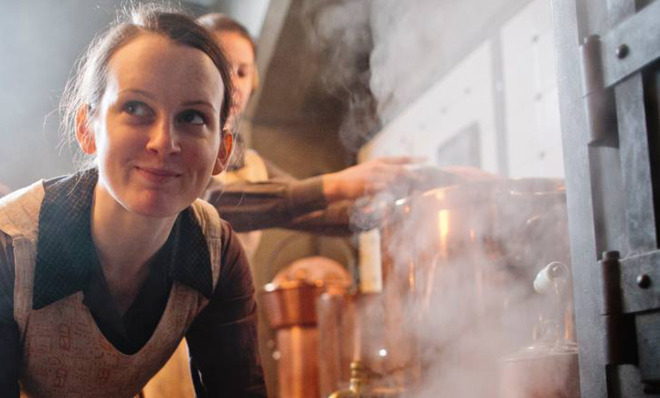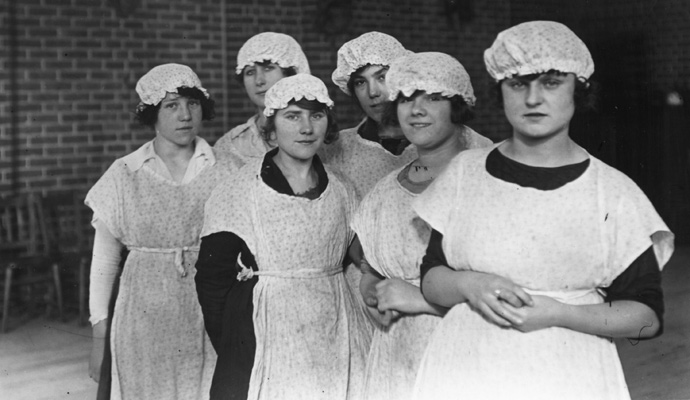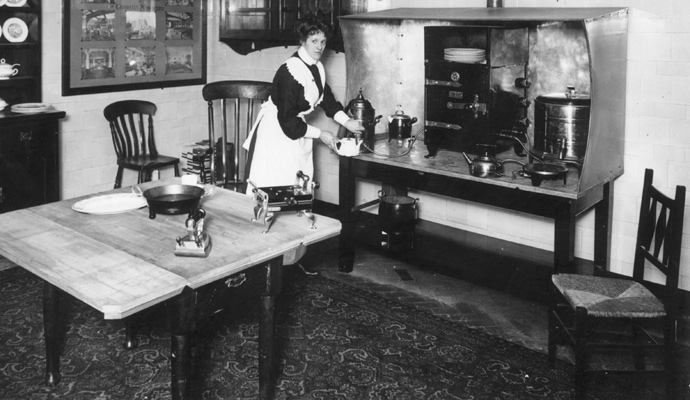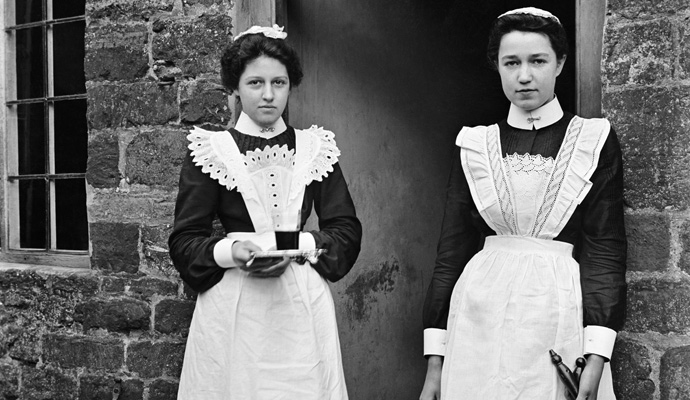How to be a servant worthy of Downton Abbey
Protip: Work 18 hour days and like it


A free daily email with the biggest news stories of the day – and the best features from TheWeek.com
You are now subscribed
Your newsletter sign-up was successful
In the BBC's hit show Downton Abbey, the Crawley family struggles to maintain 19th-century standards and traditions even as the 20th century rips them away. One of the traditions they value is having an enormous stable of servants to care for them, their home, and their estate.
In the 19th century, to be "in service" was a completely respectable, even fortunate position for a woman. The work was grueling, time off was limited in some cases to a single half-day every month, and you were literally a second-class citizen. But you had food in your belly, a roof over your head, and chances to advance.
In Downton terms, that means Daisy, the lowest servant we get to meet, could one day become Mrs. Patmore. As cook, Mrs. Patmore has one of the highest female ranks in the house. She never goes above stairs in fine clothes, but she rules the heart of the house and answers to no one but the Lord and Lady.
The Week
Escape your echo chamber. Get the facts behind the news, plus analysis from multiple perspectives.

Sign up for The Week's Free Newsletters
From our morning news briefing to a weekly Good News Newsletter, get the best of The Week delivered directly to your inbox.
From our morning news briefing to a weekly Good News Newsletter, get the best of The Week delivered directly to your inbox.
For a Daisy-type figure to achieve that in the 19th century, she would have to spend decades in close-mouthed, back-breaking service. She would need to obey a system of rules meant to press out her individuality and replace it with the mindset of a servant.
These rules are carefully outlined in books like 1826's The Complete Servant, by Samuel and Sarah Adams. Fans of Downton can see how the show makes an honest effort to represent the vestiges of the world these books described. But what fans don't really see in Downton is just how miserable that world could be.
The life of a lower servant like Daisy involved more work than we, as Westerners in the cozy confines of the 21st century, can really wrap our heads around. The simple act of getting a cup of milk involved at least a dozen more physical tasks than it would today. Here is a description of a kitchen maid's morning:
The kitchen-maid must always rise betimes, light the kitchen fire, and set on water to be heated for all the purposes of the family, the first thing she does. She next scours the dressers and shelves, and the kitchen tables, with soap and sand, and hot water; and cleans up the kitchen: She then clears out and cleans the housekeeper's room, the hall and passages, the front door, and area steps, the larder, and the butler's pantry. She then prepares the breakfasts in the housekeeper's room, and the servants hall. These things, if she be active, she will have accomplished before the cook begins to require her attention and attendance in the larder, in the furtherance of the culinary preparations; to which, however, she must have an eye, even from her earliest rising.
In less wealthy houses she would also have to act as scullery maid, adding the following to her duties:
A free daily email with the biggest news stories of the day – and the best features from TheWeek.com
...to light the fires in the kitchen range, and under the copper or boilers, and stew-holes — to wash up all the plates and dishes — scour and clean all the sauce-pans, stew-pans, kettles, pots, and all other kitchen utensils; and to take care that all the latter are always kept clean, dry, and fit for use. She is to assist in picking, trimming, washing, and boiling the vegetables, cleaning the kitchen and offices, the servants'-hall, housekeeper's room, and steward's room; and to clean the steps of the front door and the area. She makes the beds for the stable men — and generally fetches, carries, and clears away for the cook and otherwise assists in all the laborious parts of the kitchen business.

Even more important than making sure a girl understands that her foreseeable future will be spent in endless, grimy toil, is making her realize how lucky she is to have that future.
When young persons first enter upon service, they should be thankful to God if they have obtained a situation where they may be instructed in those domestic duties which are to be the business of their lives. They ought also to be very thankful, and very submissive, to those who will take the trouble to teach them. Such cannot shew their gratitude in a better way than by continuing, as long as possible, in their first service.
So how much money does a girl make for all this? Well, mostly you're getting paid in how great it feels to not be homeless. But in actual money, a kitchen maid in a "Household Establishment of a respectable Country Gentleman, with a young family, whose Net Income is from 16,000 pounds to 18,000 pounds a Year," write the Adamses, would make about £14 a year.
Converting that to today's money is tricky, because the basket of goods index isn't static (we actually buy meat at a cheaper price today than 100 years ago because of factory farming, etc.). But most calculations support that in the year 2012, £14 pounds was equal to £1,270.00 ($2,095).
That's right: A kitchen maid who spent her 18-hour days elbow-deep in grease and soot, scrubbing every surface in sight on her hands and knees, and obeying the demands of every other servant in the house, made about $2,000 a year. Granted she did not pay room and board. Her male counterpart, the under footman, made a whopping £20.
And yes, the pay gap between male and female employees was quite enormous. Carson the butler would have earned £50 a year (although in his case he would have been worth every shilling), and Mrs. Hughes, his counterpart, £24 (the highest female wage in the house). Mrs. Patmore likely would have earned the same for the multi-course culinary perfection she sent upstairs three times a day. And how it would have upset her to learn that had she been a "French man-cook," her salary would have been a jaw-dropping £80.

Perhaps wary of that measly £14, the Adamses go out of their way to remind would-be servant girls that the world is one big savage death pit.
Young Persons, Female Servants, and others of a similar rank in life, we more especially address ourselves to you! You think with horror of murder, and of prostitution; but you perhaps little reflect, that idleness and self-will, — that the love of dress, and of indulgence, — that petty acts of dishonesty, — that misbehaviour in a place — that refusing to submit to reproof, — that rashly throwing yourselves out of a situation in a regular family, — that wasting your money, and thus leaving yourselves unprovided for when out of employment, — that breaking the Sabbath, and particularly rambling about in idle company on the evenings of the Sabbath-day — you perhaps little reflect that these, or any of these evil practices, or habits, may lead you, and that by no very long or winding path, to the atrocious crimes which I have mentioned.
Meaning: "We don't want you to be alarmed, ladies, but if you buy that dress with the frivolous lace, you will be stabbed to death by one of your johns. It is simple cause and effect."
Dress as becomes your station, if you desire to please your employers,—to avoid personal harm, and to diminish the number and power of your temptations. The happiness of society arises from each of us keeping in our station, and being contented with it.
Once a girl is properly attired, she can turn her attention to the myriad other things that could turn her life into a misery. Like friendships.
A female servant should never make friendships with, or take the advice of, milk people, butchers' or bakers' servants, keepers of chandlers' shops, green-stalls, charwomen, &c.; for mostly they seek only their own interest and profit in every thing.
Besides, a good servant girl's life offers something much better than friendships. Attentive silence!
The virtue of Silence is highly commendable, and will contribute greatly to your ease and prosperity. Never talk of yourself, — but when others speak of themselves, listen to them; — such attention will please them, and probably profit yourself, as it is a chance but something escapes them that may afford a clue to their whole character.

Besides, making friends could lead to other indiscretions.
Be very careful of your reputation for virtue and discretion in regard of the other sex; for it is the foundation of your happiness in this world; and the loss of it will bring you to misery. Avoid as much as possible going out in the evening, especially on frivolous errands. Be cautious as to whom you give your company. "Evil communications corrupt good manners." Never go to fairs, dances, nor to the theaters. Ask yourself, before you engage in any pleasuring scheme — what may be the probable end of it?
You know, even the ever proper Mrs. Hughes went to the fair in Downton. Mrs. Patmore, too. And I just dare you to question Mrs. Patmore's virtue to her face.
And the real misery of it all is that even if you are a good girl who devotes her life to the pleasing of her Mistress and Jesus (in that order), you still can end up a prostitute's corpse!
It is a fact well ascertained, that many females, totally unconscious of their danger, have been hired from such offices, as servants, by keepers of infamous houses, for no other actual purpose than that of seduction, or prostitution! Many, decent looking, but wicked women, are employed, even in the streets, to find out, and strongly recommend, young girls to places as servants. By this horrible deceit, many artless females are unawares drawn into disgrace, disease, and hasty death!
The Adamses knew that servant life was horrendously difficult, even miserable. The fact that so many people flocked to service speaks of how tough the alternatives were. In Downton's era, it was possible to break out: To take a correspondence course to train for one of the new jobs that came with the advent of the 20th century, like Gwen Dawson did.
But for most of the 19th century, a working-class girl could no more become a secretary than she could become King of Narnia. It was marriage, the scullery, or fatal poverty.
Therese O'Neill lives in Oregon and writes for The Atlantic, Mental Floss, Jezebel, and more. She is the author of New York Times bestseller Unmentionable: The Victorian Ladies Guide to Sex, Marriage and Manners. Meet her at writerthereseoneill.com.
-
 Nuuk becomes ground zero for Greenland’s diplomatic straits
Nuuk becomes ground zero for Greenland’s diplomatic straitsIN THE SPOTLIGHT A flurry of new consular activity in the remote Danish protectorate shows how important Greenland has become to Europeans’ anxiety about American imperialism
-
 ‘This is something that happens all too often’
‘This is something that happens all too often’Instant Opinion Opinion, comment and editorials of the day
-
 House votes to end Trump’s Canada tariffs
House votes to end Trump’s Canada tariffsSpeed Read Six Republicans joined with Democrats to repeal the president’s tariffs
